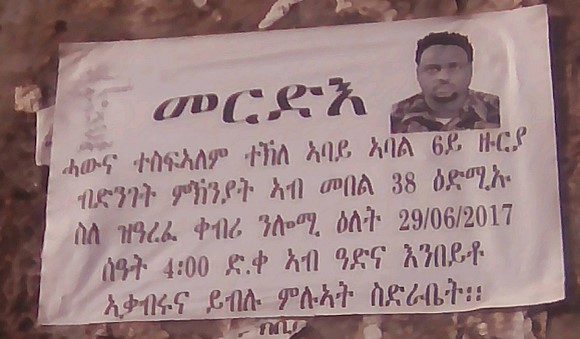Family recovers body of shoot-to-kill victim at Eritrea border

29 July 2017
Family recovers body of shoot-to-kill victim at Eritrea border
Tesfalem Tekle Abay was only 38 when he was killed at the Eritrean border whilst attempting to leave the country. A photograph smuggled from the repressive country shows an obituary notice by the family inviting members of the community to attend his funeral, as is customary. His conscription round is included in the notice, an identifier which has become part and parcel of the identity of the Eritrean population. He was conscripted on the 6th round of the Eritrean Compulsory National Service, in the late 1990s.
In Eritrea, the shoot-to-kill policy at the border has been in practice for over a decade and many victims have gone missing, but news of their fate is only made available by fellow travellers who managed to survive or citizens of the villages who happen to be near the incidents. As a consequence, the bereaved families have no choice but to mourn and hold wakes without the bodies of their family members. Such was the fate of Yohana’s family last year. At only 26, she was a member of the 26th round when she was shot dead near Haykota in October 2016.
The murder of Eritreans attempting to cross the border in an attempt to escape the indefinite slave labour that is the national service is among many of the criminal practices which the Eritrean government is perpetrating. Those who are captured at the border have repeatedly informed of the torture they suffer once they manage to escape the country. Arbitrary detention, torture, extra-judiciary killings, rape and other practices have led a UN Commission of Inquiry conclude that crimes against humanity have been committed in Eritrea and refer the matter to the Security Council and the African Union barely a year ago in June 2016. Worrying developments, led by the refugee crisis in Europe, indicate that Member States of the EU are starting to turn a blind eye to events like the shoot-to-kill policy, but the practice continues to this day.
In a rare occasion, Tesfalem’s family managed to obtain his corpse from the Eritrean border control, which on June 24th and 25th informed the families of 27 individuals of the death of their family members at the border. The Eritrean border control has only given out the names and photographs of those who died at the border, but refused to give the corpses to the families. The news, which was published on Erimedrek.com, also informed that 7 families were detained after insisting that the bodies of their family members be handed over to them.
Human Rights Concern–Eritrea’s sources confirm Tesfalem was killed by the Eritrean border control. His family held his funeral on June 29th 2017, but they could only state ‘incident’ as the cause of death in the public notice below (In Tigrigna Language).

Human Rights Concern – Eritrea
This email address is being protected from spambots. You need JavaScript enabled to view it.
www.hrc-eritrea.org


![[AIM] Asmarino Independent Media](/images/logo/ailogo.png)
